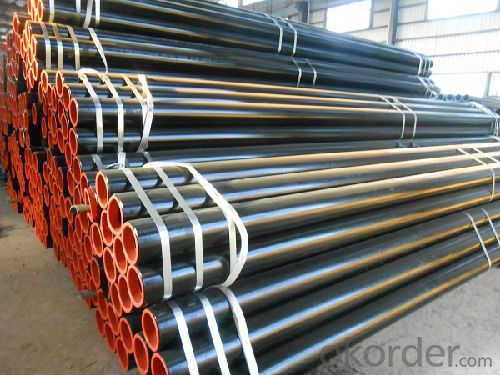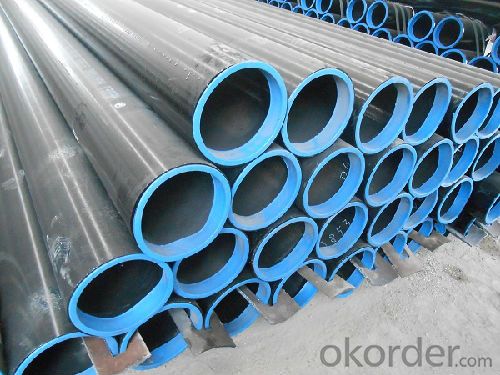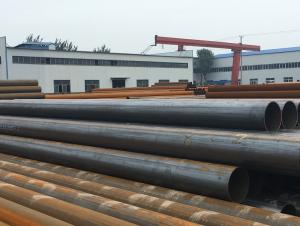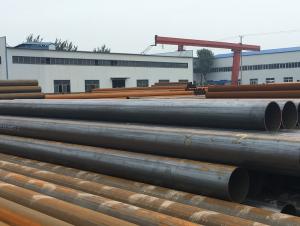Seamless Steel Pipe for high pressure fluids
- Loading Port:
- Tianjin
- Payment Terms:
- TT or LC
- Min Order Qty:
- 15 m.t.
- Supply Capability:
- 16000 m.t./month
OKorder Service Pledge
OKorder Financial Service
You Might Also Like
1、Structure of Seamless Steel Pipe for high pressure fluids
Seamless pipe is formed by drawing a solid billet over a piercing rod to create the hollow shell. As the manufacturing process does not include any welding, seamless pipes are perceived to be stronger and more reliable. Historically seamless pipe was regarded as withstanding pressure better than other types, and was often more easily available than welded pipe.
2、Main Features of Seamless Steel Pipe for high pressure fluids
• High manufacturing accuracy
• High strength
• Small inertia resistance
• Strong heat dissipation ability
• Good visual effect
• Reasonable price
3、Seamless Steel Pipe for high pressure fluids Specification:
Standard | GB, DIN, ASTM ASTM A106-2006, ASTM A53-2007 |
Grade | 10#-45#, 16Mn 10#, 20#, 45#, 16Mn |
Thickness | 8 - 33 mm |
Section Shape | Round |
Outer Diameter | 133 - 219 mm |
Place of Origin | Shandong, China (Mainland) |
Secondary Or Not | Non-secondary |
Application | Hydraulic Pipe |
Technique | Cold Drawn |
Certification | API |
Surface Treatment | factory state or painted black |
Special Pipe | API Pipe |
Alloy Or Not | Non-alloy |
Length | 5-12M |
Outer Diameter | 21.3-610mm |
Grade | 20#, 45#, Q345, API J55, API K55, API L80, API N80, API P110, A53B |
Standard | ASME, ASTM |
1) Material:20#(ASTM A 106/A53 GRB.API5LGRB,GB),45#,16Mn,10#.
2) Specification range:OD:21.3-610mm,WT:6-70mm,length:6-12m or according to the requirement of clients.
3) Excutive standards:GB,ASME API5L.ASTM A 106/A53,Despite of the above standards,we can also supply seamless steel pipe with standard of DIN,JIS,and so on,and also develop new products according to the requirements of our clients!
4) Surface:black lacquered,varnish coating or galvanized.
5) Ends:Beveled or square cut,plastic capped,painted.
6) Packing:bundles wrapped with strong steel strip,seaworthy packing.
4、Packaging & Delivery
Packaging Details: | seaworthy package,bundles wrapped with strong steel strip |
Delivery Detail: | 15-30days after received 30%TT |
5、FAQ of Seamless Steel Pipe for high pressure fluids
①How is the quality of your products?
Our products are manufactured strictly according to national and internaional standard, and we take a test
on every pipe before delivered out. If you want see our quality certifications and all kinds of testing report, please just ask us for it.
Guaranteed: If products’ quality don’t accord to discription as we give or the promise before you place order, we promise 100% refund.
Why should you chose us?
Chose happens because of quality, then price, We can give you both.Additionally, we can also offer professional products inquiry, products knowledge train(for agents), smooth goods delivery, exellent customer solution proposals.Our service formula: good quality+good price+good service=customer’s trust
SGS test is available, customer inspection before shipping is welcome, third party inspection is no problem.
6、Seamless Steel Pipe for high pressure fluids Images:


- Q:Can steel pipes be used for natural gas distribution?
- Yes, steel pipes can be used for natural gas distribution. Steel pipes are commonly used for this purpose due to their durability, strength, and ability to withstand high pressure and extreme temperatures. Additionally, steel pipes are resistant to corrosion, making them suitable for transporting natural gas over long distances.
- Q:What is the abrasion resistance of steel pipes?
- The abrasion resistance of steel pipes is relatively high. Steel is known for its strength and durability, making it resistant to wear and tear caused by friction and impact. This characteristic makes steel pipes an excellent choice for industries and applications where abrasion is a common concern, such as mining, oil and gas, and transportation of abrasive materials. Additionally, steel pipes can be further enhanced with coatings or linings to provide even greater abrasion resistance, depending on the specific requirements of the application. Overall, steel pipes offer a reliable and long-lasting solution for handling abrasive substances and environments.
- Q:Can steel pipes be used for chemical processing plants?
- Yes, steel pipes can be used for chemical processing plants. Steel pipes are commonly used in chemical processing plants due to their strength, durability, and resistance to corrosion, making them suitable for transporting various chemicals and fluids safely and efficiently. Additionally, steel pipes can withstand high temperatures and pressures, which are often encountered in chemical processing operations.
- Q:What are the different methods of heat treatment for steel pipes?
- There are several methods of heat treatment for steel pipes, including annealing, normalizing, quenching, tempering, and stress relieving.
- Q:How are steel pipes insulated against heat loss?
- Steel pipes can be insulated against heat loss using several methods. One common method is through the use of insulation materials such as mineral wool or fiberglass wraps. These materials are wrapped around the pipes to create a barrier that reduces heat transfer. Another method is the application of insulation coatings, such as foam or rubber coatings, directly onto the surface of the pipes. These coatings create a protective layer that minimizes heat loss. Additionally, thermal tape or heat-resistant tape can be used to seal any gaps or joints in the insulation, ensuring a continuous barrier against heat loss. Overall, insulating steel pipes against heat loss is essential to maintain the temperature of the fluid or gas being transported and to increase energy efficiency in various industries.
- Q:What are the common factors affecting the lifespan of steel pipes?
- Steel pipes can have their lifespan significantly reduced by various common factors. One primary factor is corrosion, which occurs when the steel is exposed to moisture, chemicals, and harsh environmental conditions, leading to rust and deterioration over time. Another determinant of the lifespan of steel pipes is the quality of materials used in their manufacturing. Higher-grade steel with better resistance to corrosion and degradation generally lasts longer compared to lower-quality materials. Proper installation and regular maintenance are crucial for ensuring the longevity of steel pipes. Inadequate support or improper alignment during installation can cause premature failure, while neglecting routine maintenance, such as cleaning and inspection, can speed up the degradation process. The operating conditions also play a role in the lifespan of steel pipes. Factors like temperature, pressure, and the type of fluid or gas being transported can affect the pipes' integrity. Extreme conditions, such as high temperatures or exposure to corrosive substances, can significantly reduce their lifespan. Excessive mechanical stress, including vibration, impact, or heavy loads, can weaken steel pipes over time. If not properly managed or accounted for during the design and installation process, this stress can lead to cracking, deformation, or even complete failure. The surrounding environment also influences the lifespan of steel pipes. Exposure to harsh weather conditions, such as extreme temperature variations or frequent freeze-thaw cycles, can expedite the deterioration process. Pollutants or aggressive substances in the surrounding soil or water can also contribute to the degradation of steel pipes. To ensure the durability and reliability of steel pipes, it is essential to consider and address factors such as corrosion, material quality, installation and maintenance practices, operating conditions, mechanical stress, and environmental factors. By doing so, the lifespan of steel pipes can be extended.
- Q:Can steel pipes be used for underground water lines?
- Yes, steel pipes can be used for underground water lines. Steel pipes are commonly used for water distribution systems as they are durable, strong, and resistant to corrosion. However, it is important to consider the specific conditions and requirements of the project, as other types of pipes such as PVC or HDPE may be more suitable in certain situations. Proper coating and insulation should also be applied to steel pipes to protect against underground environmental factors.
- Q:How are steel pipes joined together?
- Steel pipes are typically joined together using various methods such as welding, threading, and flanging. Welding involves melting the ends of the pipes and fusing them together, creating a seamless connection. Threading involves cutting screw-like grooves on the pipe ends, which are then screwed tightly together using a threaded coupling. Flanging involves adding a flange, a flat plate with holes, to each pipe end, and then bolting them together securely. These joining techniques ensure strong and durable connections between steel pipes.
- Q:What are the different methods of cleaning steel pipes?
- There are several methods of cleaning steel pipes, including mechanical cleaning, chemical cleaning, and high-pressure water jetting. Mechanical cleaning involves using wire brushes, scrapers, or sandpaper to physically remove debris and rust from the pipe's surface. Chemical cleaning involves using solvents or acids to dissolve contaminants and rust, followed by flushing the pipe with water. High-pressure water jetting uses a stream of water at high pressure to remove dirt, rust, and other deposits from the pipe's interior and exterior surfaces.
- Q:Can steel pipes be used for oil transportation?
- Yes, steel pipes can be used for oil transportation. Steel pipes are commonly used in the oil and gas industry for the transportation of crude oil, petroleum products, and natural gas. They are preferred due to their strength, durability, and resistance to corrosion. Steel pipes are capable of withstanding high-pressure environments and can be used for both onshore and offshore oil transportation. Additionally, steel pipes can be welded together to form long pipelines, making them a cost-effective solution for transporting oil over long distances. Overall, steel pipes are a reliable and efficient choice for oil transportation.
1. Manufacturer Overview |
|
|---|---|
| Location | |
| Year Established | |
| Annual Output Value | |
| Main Markets | |
| Company Certifications | |
2. Manufacturer Certificates |
|
|---|---|
| a) Certification Name | |
| Range | |
| Reference | |
| Validity Period | |
3. Manufacturer Capability |
|
|---|---|
| a)Trade Capacity | |
| Nearest Port | |
| Export Percentage | |
| No.of Employees in Trade Department | |
| Language Spoken: | |
| b)Factory Information | |
| Factory Size: | |
| No. of Production Lines | |
| Contract Manufacturing | |
| Product Price Range | |
Send your message to us
Seamless Steel Pipe for high pressure fluids
- Loading Port:
- Tianjin
- Payment Terms:
- TT or LC
- Min Order Qty:
- 15 m.t.
- Supply Capability:
- 16000 m.t./month
OKorder Service Pledge
OKorder Financial Service
Similar products
New products
Hot products
Related keywords






























